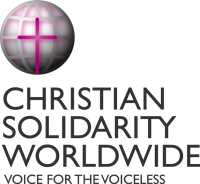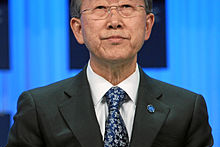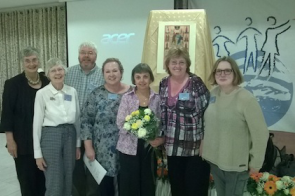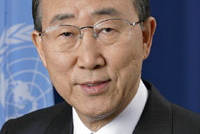Burma: NGOs urge Ban Ki Moon to negotiate humanitarian corridor in Rakhine State

Thirty three international humanitarian aid and advocacy organisations, including Christian Solidarity Worldwide and Pax Christi Australia have written today to the United Nations Secretary-General, Ban Ki-moon, urging him to give his "personal attention" to the humanitarian crisis in Rakhine State, Myanmar (Burma) and to take "a personal lead" in negotiating for humanitarian access to all areas of Rakhine State.
In an open letter, the NGOs quote the UN Assistant General-Secretary for Humanitarian Affairs, Kyung-hwa Kang, who said after visiting camps for internally displaced people in Rakhine State in June 2014 that: "I witnessed a level of human suffering in the IDP camps that I have personally never seen before ... appalling conditions .... wholly inadequate access to basic services including health, education, water and sanitation."
Those words echo the words of the Under Secretary-General for Humanitarian Affairs, Baroness Amos, who said after visiting the camps in December 2012: "I have seen many camps during my time but the conditions in these camps rank among the worst. Unfortunately we as the United Nations are not able to get in and do the range of work we would like to do with those people, so the conditions are terrible ... It's a dire situation and we have to do something about it."
At least 70 per cent of Rohingya currently have no access to safe water or sanitation services. In Maungdaw Township, there is just one doctor per 160,000 people. The World Health Organisation recommends one doctor per 5,000 people. Only two per cent of Rohingya women give birth in a hospital.
In the letter, the NGOs say: "While the crisis is most acute in the camps, it is important to note that around 800,000 Rohingya living outside the camps are also in urgent need of assistance. In some areas the rates of malnutrition are over 20 per cent and the provision of health services is almost non-existent."
They also argue that "it is essential also that humanitarian aid is not only provided to the Rohingya, but also to all those in need of assistance. Rakhine State is the second poorest state in Myanmar, where 44 per cent of the population lives below the poverty line - almost twenty per cent more than the average in most parts of Myanmar."
The NGOs conclude their appeal by recalling Ban Ki-moon's efforts in the aftermath of the humanitarian disaster following Cyclone Nargis. They write: "Mr Secretary-General, in 2008 following the appalling humanitarian crisis after Cyclone Nargis, the regime in Myanmar initially refused access to international aid organisations. You personally took charge of the effort by the international community to negotiate access, and you succeeded. As a result, hundreds of thousands of lives were saved. We believe the crisis in Rakhine State demands a similar response, and we therefore urge you to take a personal lead in negotiating with the Government of Myanmar for humanitarian access to all areas of Rakhine State, for humanitarian aid to be provided to all in need, regardless of race or religion. Hundreds of thousands of people who have little food, medicine or shelter and have been stripped not only of their citizenship but also their basic dignity are looking to you and to the United Nations for help. We appeal to you not to fail them."
A full copy of the letter to the UN Secretary-General is below.
This statement is signed by the following organisations:
Actions Birmanie (Belgium)
ALTSEAN- Burma
Asia Pacific Refugee Rights Network
Association Suisse-Birmanie
Avaaz
Building Social Democracy in Burma (A project under ASD Sweden)
Burma Action Ireland
Burma Campaign UK
Burma Partnership
Burmese Rohingya Organisation UK
Christian Solidarity Worldwide
Equal Rights Trust
FIDH / International Federation for Human Rights
Fortify Rights
Humanitarian Aid Relief Trust (HART)
Human Rights Watch
Info Birmanie (France)
Institute for Asian Democracy
International State Crime Initiative, Queen Mary University of London
Norwegian Burma Committee
Partners for Relief and Development
Pax Christi Australia
Physicians for Human Rights
Quilliam Foundation
Refugees International
Restless Beings
Rohingya Community Ireland
Society for Threatened Peoples (Germany)
Swedish Burma Committee
Social Democratic Students Burma Project (SDS)
SHARP-Pakistan
United to End Genocide
US Campaign for Burma
Letter to UN Secretary-General Ban Ki-moon
The Honourable Ban Ki-moon
Secretary General
760 United Nations Plaza
United Nations
New York, NY 10017
Dear Secretary-General,
We are writing as representatives of international organisations deeply concerned about the escalating humanitarian crisis in Rakhine State, Myanmar (Burma), to urge you to give this situation increased personal attention and to use your personal influence to urge the Government of Myanmar to increase access for international humanitarian aid to Rakhine State.
As you are well aware, at least 140,000 Rohingya people who were forced to flee their homes after horrific violence in June and October 2012 now live in temporary camps where humanitarian access is severely restricted as a result of the policies of the Government of Myanmar and the failure of the government to ensure a secure environment for the delivery of aid. At least 80,000 Rohingya have fled Myanmar by boat, facing an extremely precarious fate at sea because of the desperate situation they face in their own country.
According to our sources, at least 70 per cent of Rohingyas currently have no access to safe water or sanitation services. In Maungdaw Township, there is just one doctor per 160,000 people. The World Health Organisation recommends one doctor per 5,000 people. Only two per cent of Rohingya women give birth in a hospital.
The former UN Special Rapporteur on the Situation of Human Rights in Myanmar, Tomás Ojea Quintana, stated in April 2014:
".... the deprivation of health care is deliberately targeting the Rohingya population, and that the increasingly permanent segregation of that population is taking place. Furthermore, he believes that those human rights violations are connected to discriminatory and persecutory policies against the Rohingya Muslim population, which also include ongoing official and unofficial practices from both local and central authorities restricting rights to nationality, movement, marriage, family, health and privacy."
The humanitarian crisis is most acute in the camps for internally displaced peoples. In June 2014, the UN Assistant General-Secretary for Humanitarian Affairs, Kyung-hwa Kang, said after visiting the camps: "I witnessed a level of human suffering in the IDP camps that I have personally never seen before ... appalling conditions .... wholly inadequate access to basic services including health, education, water and sanitation."
Those words echo the words of the Under Secretary-General for Humanitarian Affairs, Baroness Amos, who said after visiting the camps in December 2012: "I have seen many camps during my time but the conditions in these camps rank among the worst. Unfortunately we as the United Nations are not able to get in and do the range of work we would like to do with those people, so the conditions are terrible ... It's a dire situation and we have to do something about it."
In October 2014, the spokesman for the UN Office for the Coordination of Humanitarian Affairs in Myanmar, Mr Pierre Peron, said of one particular camp, Nget Chaung: "No one should have to live in the conditions that we see in Nget Chaung".
The current UN Special Rapporteur on the Situation of Human Rights in Myanmar Yanghee Lee has noted in her September 2014 report to the UN General Assembly: "disturbing reports of deaths in camps owing to lack of access to emergency medical assistance and owing to preventable, chronic or pregnancy-related conditions."
While the crisis is most acute in the camps, it is important to note that around 800,000 Rohingya living outside the camps are also in urgent need of assistance. In some areas the rates of malnutrition are over 20 per cent and the provision of health services is almost non-existent.
It is essential also that humanitarian aid is not only provided to the Rohingya, but also to all those in need of assistance. Rakhine State is the second poorest state in Myanmar, where 44 per cent of the population lives below the poverty line - almost twenty per cent more than the average in most parts of Myanmar.
Aid organisations have faced severe restrictions, harassment and threats of expulsion from Rakhine State, and the delivery of aid has often been blocked as a result of local campaigns against international humanitarian organisations.
Mr Secretary-General, in 2008 following the appalling humanitarian crisis after Cyclone Nargis, the regime in Myanmar initially refused access to international aid organisations. You personally took charge of the effort by the international community to negotiate access, and you succeeded. As a result, hundreds of thousands of lives were saved. We believe the crisis in Rakhine State demands a similar response, and we therefore urge you to take a personal lead in negotiating with the Government of Myanmar for humanitarian access to all areas of Rakhine State, for humanitarian aid to be provided to all in need, regardless of race or religion. Hundreds of thousands of people who have little food, medicine or shelter and have been stripped not only of their citizenship but also their basic dignity are looking to you and to the United Nations for help. We appeal to you not to fail them.
Yours sincerely,


















